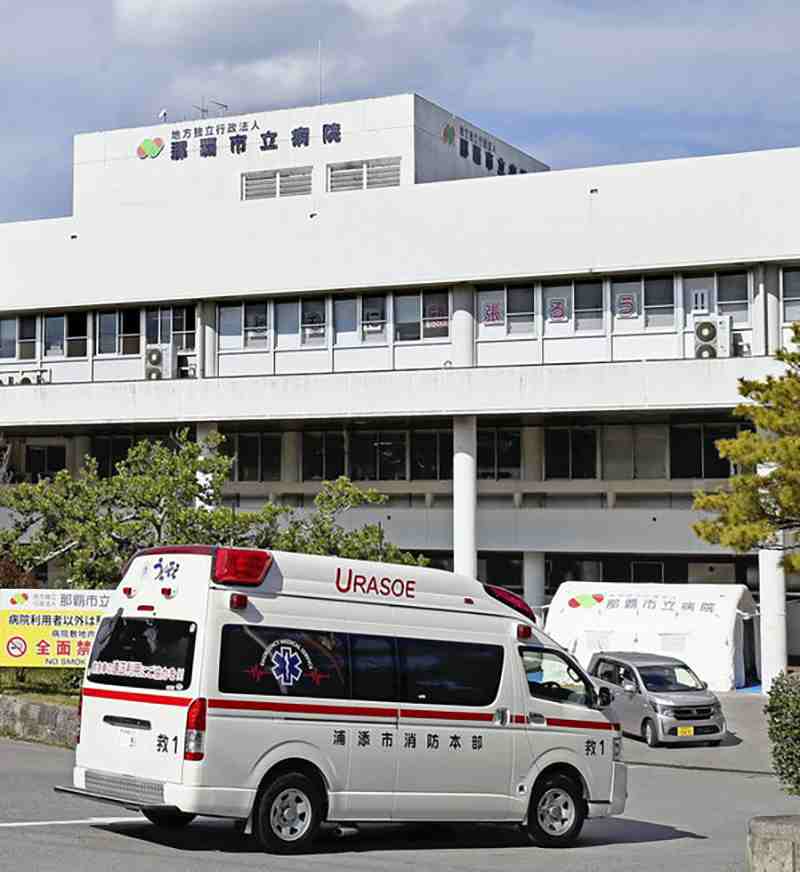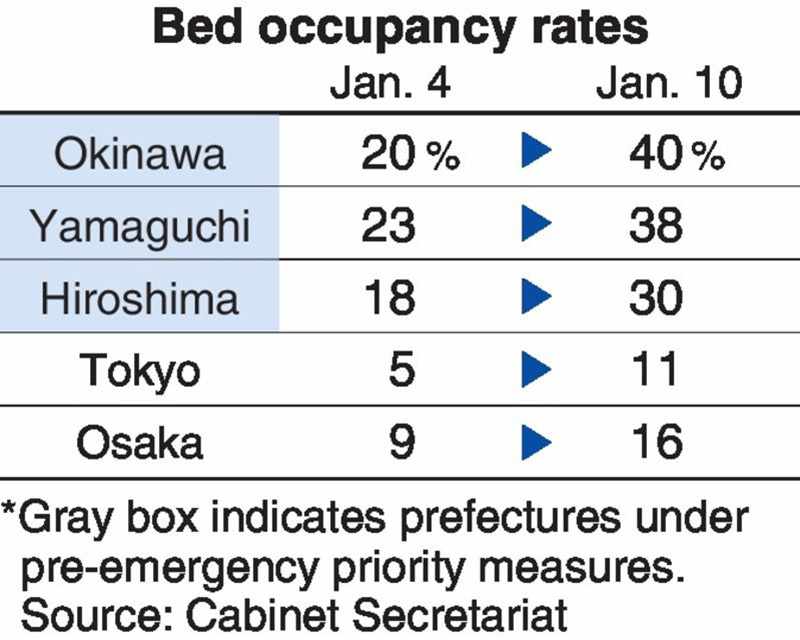
Naha City Hospital in Okinawa Prefecture, where bed occupancy rates are on the rise
19:07 JST, January 12, 2022
The rapid spread of the omicron variant has prompted a change of course by the administration of Prime Minister Fumio Kishida.
Conscious of the fact that a deterioration in the pandemic situation would be a major blow to his administration, Kishida announced measures Tuesday that shifted the focus from containment to expanding at-home care services to prevent hospitals from becoming overwhelmed.
Kishida has clearly stressed the government’s commitment to bolstering the healthcare system, likely aiming to alleviate the public’s concerns.
“Medical services, which have been preparing for a 6th wave, will be checked and reinforced,” Kishida said to reporters at the Prime Minister’s Office on Tuesday, emphasizing his intention of taking thorough measures to deal with the omicron variant.
The administration had been trying to contain the variant, but with the spread of infections reaching a new stage, the administration will shift its emphasis to bolstering medical services.
Some experts believe the 6th wave of infections is already underway, with omicron replacing delta as the dominant variant in Japan.
On Tuesday, the Tokyo metropolitan government announced that omicron is responsible for about 80% of new cases.
Medical facilities are already under strain in Okinawa Prefecture, where pre-emergency measures have been applied to stem the surge in infections.
Hospital bed occupancy, which rose from 20% on Jan. 4 to 40% on Jan. 10, is approaching 50%, a yardstick for such measures as a state of emergency declaration.
To prevent medical facilities from being overwhelmed, providing at-home care services and designated accommodation facilities for recuperating patients will be key.
By avoiding the hospitalization of mild patients, hospitals should be able to maintain a certain number of available beds.
Medical institutions notify public health centers when they detect coronavirus infections. Health centers then assess whether the patients need to be hospitalized or isolated at home or a designated facility, by taking into account the severity of their symptoms and the risk of serious illness, among other factors.

Health centers continue to check in with the patients, and if their condition worsens, they will arrange hospitalization.
To lessen the burden on public health centers, the government has developed a system under which local medical institutions will share the responsibility of monitoring patients who are recuperating at home.
Although a plan announced in December stated 12,000 institutions had been signed up, on Tuesday, Kishida stressed that 16,000 would be sharing the load.
The participation of medical personnel who have until now not been involved in the pandemic response will be key, according to the government.
Health centers had also been responsible for investigating the source of infections. Going forward, the Health, Labor and Welfare Ministry plans to only investigate the source of infections linked to facilities for people at risk of becoming seriously ill, such as elderly care homes, medical institutions.
Health centers have also been told to scale back genome analysis to identify variants so that personnel can be freed up to handle patients.
Oral medicine is seen as a vital measure for at-home treatment, but patients need to receive the drug as quickly as possible following the onset of the disease. The health ministry is asking local governments to develop a system so that the medicine can be administered on the day of diagnosis or the following day.
The Prime Minister has taken it upon himself to announce coronavirus measures before the omicron outbreak gets out of control in light of the backlash faced by his predecessor, Yoshihide Suga, who was criticized for being slow to react to the pandemic and not communicating information clearly.
Kishida briefed reporters about the new measures when he arrived at the Prime Minister’s Office on Tuesday morning.
His forward-thinking approach has been well received so far, but there have also been occasions when measures were unveiled before they had been hammered out in detail.
This time, too, details are lacking regarding a timeline for the distribution of booster vaccine doses and discharge criteria for coronavirus patients.
The success of the latest measures will hinge on Kishida’s leadership and the concerted efforts of relevant ministers.
Surge in cases overseas prompted extension of border restrictions
By Junpei Odake / Yomiuri Shimbun Staff Writer
The daily number of coronavirus cases detected at airports was less than 20 in early December, but by Dec. 29 it had exceeded 100. The average daily tally in the seven-day period through Monday was 155.
The surge in cases overseas prompted Prime Minister Fumio Kishida to extend the strict border control measures that have been in place since the outbreak of the omicron coronavirus variant in Japan.
The government requires Japanese returnees and foreign residents arriving from 69 countries and regions to be quarantined at designated facilities for three to 10 days. However, it has become difficult to secure hotels and other quarantine facilities around Narita Airport and Haneda Airport, two of the busiest airports in Japan.
The central government had asked local governments to let it quarantine arrivals at hotels and other accommodation facilities that had been designated for local COVID-19 patients and others, but some municipalities now want to use the facilities for residents amid a domestic surge in cases.
There have also been strong calls to relax entry restrictions for foreign technical interns, who are a valuable asset to industries suffering labor shortages, and international students, who are essential for international exchanges at universities.
The government intends to monitor the infection situation in Japan and abroad, and carefully assess when to ease restrictions.
There is a view within the government that the quickly spreading omicron variant might subside rapidly.
Some observers think the government will be able to ease the restrictions by the end of February.
The government is also considering a more flexible approach to the issuance of exceptional entry permits for spouses of Japanese nationals and is also mulling easing the restrictions on the entry of foreign students.
Top Articles in Society
-

Man Infected with Measles Reportedly Dined at Restaurant in Tokyo Station
-

Man Infected with Measles May Have Come in Contact with Many People in Tokyo, Went to Store, Restaurant Around When Symptoms Emerged
-

Woman with Measles Visited Hospital in Tokyo Multiple Times Before Being Diagnosed with Disease
-

Australian Woman Dies After Mishap on Ski Lift in Nagano Prefecture
-

Foreign Snowboarder in Serious Condition After Hanging in Midair from Chairlift in Nagano Prefecture
JN ACCESS RANKING
-

Japan PM Takaichi’s Cabinet Resigns en Masse
-

Japan Institute to Use Domestic Commercial Optical Lattice Clock to Set Japan Standard Time
-

Israeli Ambassador to Japan Speaks about Japan’s Role in the Reconstruction of Gaza
-

Man Infected with Measles Reportedly Dined at Restaurant in Tokyo Station
-

Videos Plagiarized, Reposted with False Subtitles Claiming ‘Ryukyu Belongs to China’; Anti-China False Information Also Posted in Japan





















